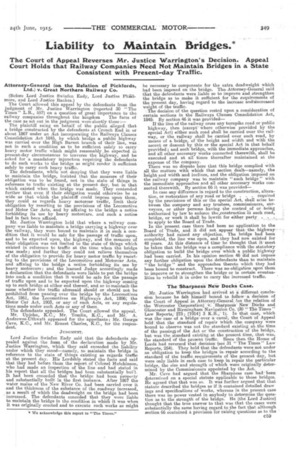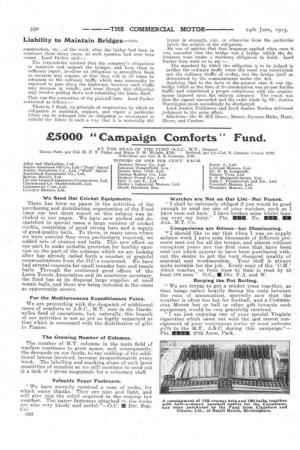Liability to Maintain Bridges.*
Page 23

Page 24

If you've noticed an error in this article please click here to report it so we can fix it.
The Court of Appeal Reverses Mr. Justice Warrington's Decision. Appeal Court Holds that Railway Companies Need Not Maintain Bridges in a State Consistent with Present-day Traffic.
Attorney-General (on the Relation of fnckfords, Ltd.) v. Great Northern Railway Co.
(Before Lord Justice Swinfen Eady, Lord Justiee Phildmore, and Lord Justice Bankes.) The Court allowed this appeal by the defendants from the judgment of Mr. Justice Warrington (reported 30 "The Times" L.R., 557) on a question of great importance to the
railway companies throughout the krngdom The facts of the ease as set out in the judgment were shortly these:— The plaintiff suing on behalf of the public alleged that a bridge constructed by the defendants at Crouch End in or about 1867 under an Act incorporating the Railways Clauses Consolidation Act 1845, by which bridge a public highway was carried over the High. Barnet branch of their line, was not in such a condition as to be sufficient safely to carry heavy motor traffic which might reasonably, be expected in present-day circumstances to traverse the highway, and he asked for a mandatory injunction requiring the defendants to do such works to the bridge as might render it sufficient. safely to carry such heavy traffic,
The defendants, while not denying that they were liable to maintain the bridge, insisted that the measure of their obliption was to be found, not in too state. of things in reference to traffic existing at the present day, but in that which existed when the bridge was made, They contended further that even if their obligation would otherwise be as wide as that which the plaintiff could impose upon them, they could as regards heavy motorcar traffic, limit their obligation by resorting to the provisions of the Locomotive and Motor Car Acts, and by affixing to the bridge a notice forbidding its use by heavy motorcars, and such a notice bad in fact. been affixed.
Mr, Justice Warrington held that where a, railway company was liable to maintain a bridge carrying a highway over the railway, they were bound to maintain it in such a condition that it would be safe for the passage of traffic upon, and to be expected upon, the highway, and the measure of their obligation was not limited to the state of things which existed in reference to traffic at the time when the bridge was made ; and further they could not relieve themselves of the obligation to provide for heavy motor traffic by resorting to the provisions of the Locomotive and Motorcar Acts, and affixing to the bridge a notice forbidding its use by heavy motorcars; and the learned Judge accordingly made a declaration that the defendants were liable to put the bridge into such a condition that it would be safe for the passage of traffic upon and to be expected upon the highway coming up to such bridge at either end thereof, and so to maintain the same whether the traffic aforesaid should or should not be prohibited from passing over the bridge by the Locomotives Act, 1861, the Locomotives On Highways Act, 1896; the Motor Car Act, 1903, or any of such Acts, or any regulations made under such_ Acts or any of them.
The defendants appealed. The Court allowed the appeal. Mr. Upjohn, K.C., Mr. Tomlin, K.C., and Mr. A. Andrewes-Uthwatt appeared for the appellants; Mr. George Cave, K.O., and Mr. Ernest Charles, KG., for the respondent.
Juno-sum.
Lord Justice Swinfen Eady said that the defendants appealed against the form of the declaration made by Mr. Justice Warrington, which they said exceeded the liability under which they stood—namely, to maintain the bridge in reference to the state of things existing as regards traffic at the present day. His Lordship stated the facts and said that they had before them the report of Colonel Hutchinson, who had made an inspection of the line and had stated in his report that all the bridges had been substantially burl, It had been conceded that' the bridge had been prope? Ly and substantially built in the first instance. After 1867 the water mains of the New River Co. had been carried over it and the thickness of the substance of the roadway increased, as a result of which the deadweight on the bridge had been increased. The defendants conceded that they were liable to maintain the bridge in the condition in which it was when it was originally erected and to execute such works as might
be necessary to compensate for the extra deadweight which had been, imposed on the bridge. TheAttorney-General said that the defendants were liable so to improve and strengthen the bridge as to make it sufficient for the requirements of the present day, having regard to the increase anchaincreaaed weight of the traffic. The decision 'Of the question rested upon a consideration of certain sections in the Railways Clauses Consolidation Act, 1845: By section 46 it was provided— . If the line of the railway cross any turnpike road or public highway, then (except" whereotherwise provided by the special Act) either such road shall be carried over the railway, or the railway shall be carried over such road, by means of a bridge, of 'the height and width and with the ascent Or descent by this or the special Act in that behalf provided'; and such bridge, with the immediate approaches, and all other necessary works connected therewith, shall be executed and at all times thereafter maintained at the expense of the company. . .
There was no dispute here that this bridge complied with all the matters with which that section dealt—namely, the height and width and inclines, and the obligation imposed on the railway company was to maintain "suck bridge" with the immediate approaches and all other necessary works connected therewith. By section 66 it was provided— In case any difference in regard to the construction, alteration, or restoration of any road or bridge . . . required by the provisions of this or the special Act, shall arise between the company and any trustees, commissioners, surveyors, or other persons having the control of or -being authorized by law to enforce tha.construction-iii such road, bridge, or work it shall be Iawnii for either party . .
to apply to the Board of Trade.
In the present case there had been no application to the Board of Trade, and it did not appear that -the highway. authority had raised any objection. The bridge had been completed, the line was open, and they had now existed for 48 years. At this distance of time he thought that it' must be taken that the bridge was a compliance with the statutory obligation to build thebridge over which a public highway had been carried. In his opinion 'section 46 did not impose any further obligation upon the defendants than to maintain " the bridge" and the approaches thereto which they had been bound to construct. There was no obligation upon them to improve or to strengthen the bridge or in certain eventualities to rebuild it in order to carry the increased traffic.
The-Sharpness New Docks Case.
MrJustice Warrington had arrived at a different conclusion because he felt himself 'bound to followa, decision of the Court of Appeal in Attorney-General fon the relation of the Worcester Corporation) .v. , Sharpness New Decks and Gloucester and Birmingham Navigation Co. '(30 " The Times" Law Reports,. 273; [19141 3 K.B.,' 1). In that caie, which wast the case of a'bridge over a-canal, the -Court' of Appeal held': that the standard of repair which the company were bound to observe was not the standard existing at-the time of the passingtof the Act or 'the construction' of the bridge, but was the ,standard existing. at the present time, that was, the standarcl. of the present traffic. Since then the House of Lords had reversed that decision (see 31 "The Times" Law Reports, 254). They held that the defendants Were.not, under an obligation to keep, the bridges'in•repair according to the standard of the traffic. requirements of the .present day, but were only liable in each case to keep in, repair the particular bridge, the size and strength of which were originally.determined by the Commissioners appointed by the Act.
Mr. Cave had argued that the Sharpness case had'been determined on a special statute applicable to those bridges. He agreed that that was so. It was further argued that that statute described the bridges as if it contained detailed draw ings and specifications of works, whereas in the present case there was no power vested in anybody to determine the ques tion as to the strength of the bridge. Be (the Lord Justice) thought that the true answer to that was that the cases wore substantially the same having regard to the fact that although section 66 contained a provision for raising questions as to the construction, etc., of the work, after the bridge had been in existence these many years, no such question had ever been raised. Lord Parker said ;— The respondents contend that the company's obligations to maintain and support, the bridges, and keep them in sufficient repair, involves an obligation to strengthen them as occasion may require, so that they will at, all times be adequate to the ordinary traffic which may reasonably be expected to pass along the highways, however such traffic may increase in weight, and even though this obligation may involve pulling down and rebuilding the fabric itself.
That was the contention of the plaintiff here. Lord Parker continued as follows: 7-• There is, I think, no principle of construction by which an obligation to maintain, support, and repair a particular fabric can be enlarged into an obligation to reconstruct or rebuild the fabric in such a way that it is materially dif
ferent in strength, sire, or otherwise from the particular fabric the subject of the obligation. . He was Of opinion that that. language applied when once it was conceded that the bridge was a bridge which the defendants were under a statutory obligation to build. Lord Parker then went on to say :— The standard by which the obligation is to be judged is neither the ordinary traffic when the canal was constructed nor the ordinary traffic of to-day, but the bridge itself as determined by the commissioners under the Act.
Applying that to the facts of the present. case itwas the bridge which at the time of its construction was proper for the traffic and constituted a proper compliance with the requirements imposed upon the railway company. The result was that the appeal succeeded and the order made by Mr. Justice Warrington must accordingly be discharged. Lord Justice Phillimore and Lord Justice Bankes delivered judgment to the same effect. Solicitors—Mr. R. Hill Pa-we; Messrs. Joynson-Hicks, Hunt, Moore, and Cardew.




























